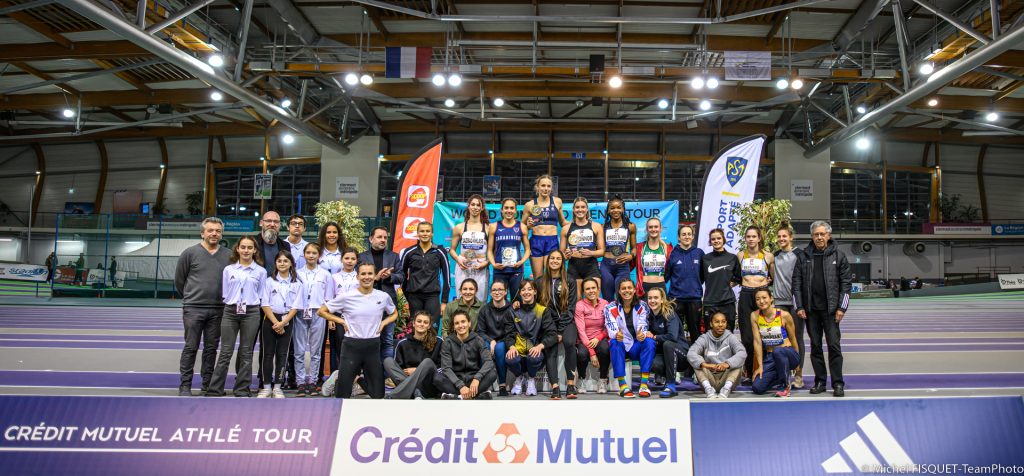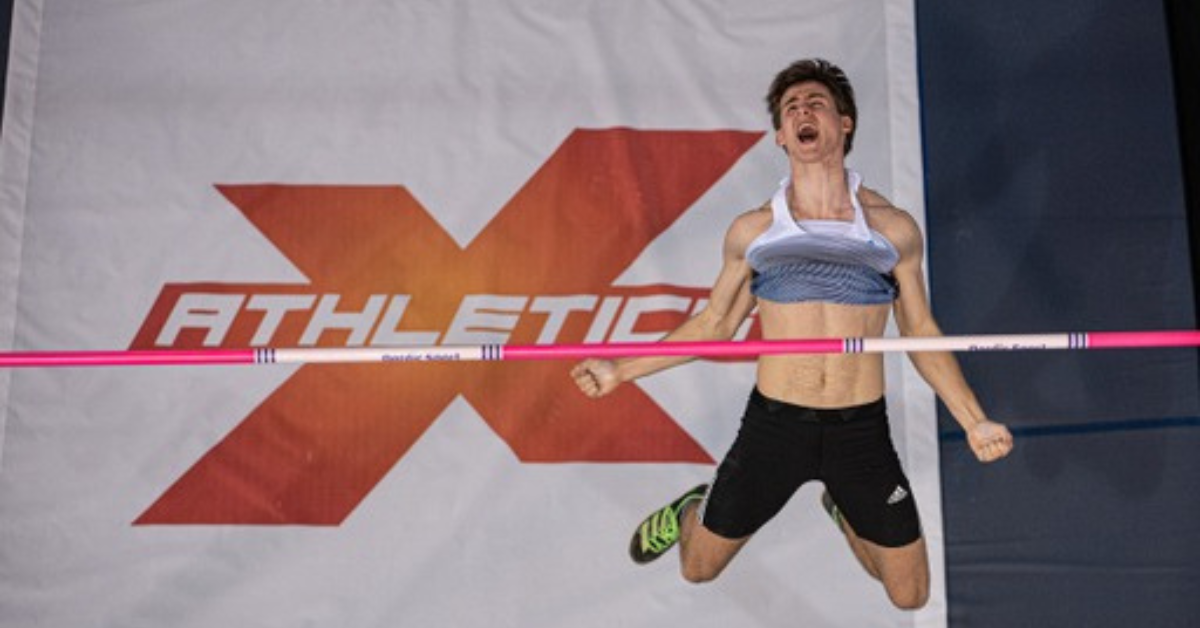At the X-Athletics meeting in Clermont Ferrand on the weekend of 28th and 29th January, Makenson Gletty and Leonie Cambours shone as the top French athletes, Simon Ehammer secured perhaps the highest heptathlon score in history with a suspected broken nose, and Jente Hauttekeete finally translated his world-leading U20 form of 2021 into the senior ranks.
MAK OVER MAYER
Ahead of the meeting, among French participants Makenson Gletty was overshadowed by the world decathlon record holder’s plan to compete in individual events, but Gletty reclaimed the spotlight among the French contingent. In the two events in which Kevin Mayer logged a mark over the weekend, Gletty ran just as fast and threw further.
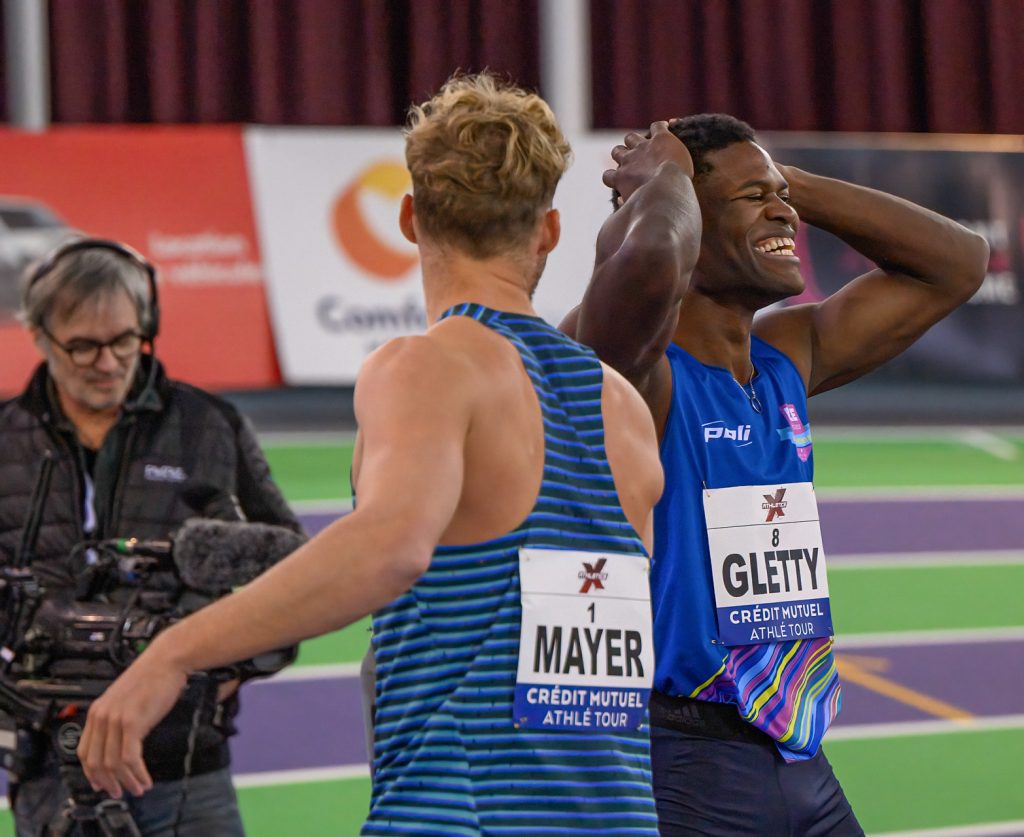
The new purple and green track at the Stadium Jean-Pellez was reportedly quick, and Gletty was among those who set lifetime bests in the 60m, running 6.89s, the same time as Mayer. Only Simon Ehammer and Finley Gaio of Switzerland ran faster, Ehammer in a meeting record of 6.80s and Gaio in 6.87s. Behind them Arthur Prevost (his first sub-7 with 6.90s) of France, Dario Dester of Italy, Nino Portmann of Switzerland, Teo Bastien of France, Marcel Meyer of Germany, Jente Hauttekeete of Belgium and Andreu Boix of Spain all set lifetime bests.
Of course, Ehammer and Gaio settled into first and second place after the first two events, 1977 and 1866 points respectively, and a cluster of athletes followed them between 1750-1800 points. The Swiss duo share outstanding 60m, long jump and hurdles, and they always begin each day of competition with a statement of intent.
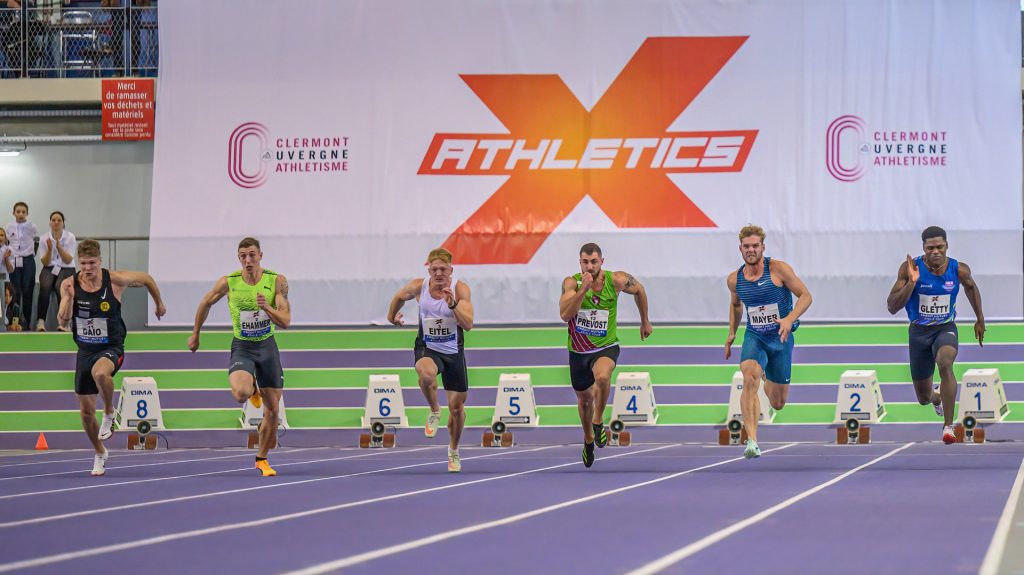
For Ehammer, the trajectory of his competition is typically defined by his long jump, and how far he leaps beyond everyone else. On this occasion his longest jump was a mere 7.85m, not helped by two fouls in the first two rounds, and less than 30cm ahead of Gaio in 7.59m (an indoor PB). But the fact that Ehammer continued to dominate the competition and rack up a score that would have placed fifth in the 2022 world lists speaks to his progress across all seven events.
Overall the second event felt somewhat lacklustre, perhaps an anti-climax from the previous year’s Ashton-Eaton-world-best-beating performance.
Behind the Swiss, Venezuelan heptathlon record-holder Gerson Izaguirre jumped a PB of 7.36m, Dester 7.29m and Meyer 7.27m PB, while Mayer had three fouls.
By this point we would have expected former winners Rik Taam of the Netherlands (11th) and Manuel Eitel of Germany (15th) to be featuring more prominently, but neither had a great weekend. Both indicated that they were unable to find their rhythm, and Taam withdrew later in the day.
If the long jump was unexpectedly low key, then the shot put brought energy to the competition.
Gletty was first to throw and his initial put was 15.58m, an indoor PB. Mayer threw next, a few cm beyond his teammate in 15.69m. That would be the furthest Kevin would throw, though, as he fouled his next two attempts, demonstrating his frustration when doing so.
The competition continued to heat up, even after Gletty’s statement opener.
Shot has not historically been one of Gaio’s strong events but he improved his indoor best with each of his first two throws – 14.20m and 14.23m – and then stretched to an outright best of 14.42m in the final round. In a single competition he improved his indoor best by over 60cm.
Eitel rallied after a sub 7m long jump to throw a PB of 14.89m and Dester was also close to his outright best with 14.53m. But Gletty brought the big one. After a foul in the second round, the Frenchman threw 16.02m, a meeting record and his first time over 16m indoors.
Ehammer threw 14.06m, solid but well below his 15.31m from the Swiss nationals in 2021.
THE HEIGHTS OF HAUTTEKEETE
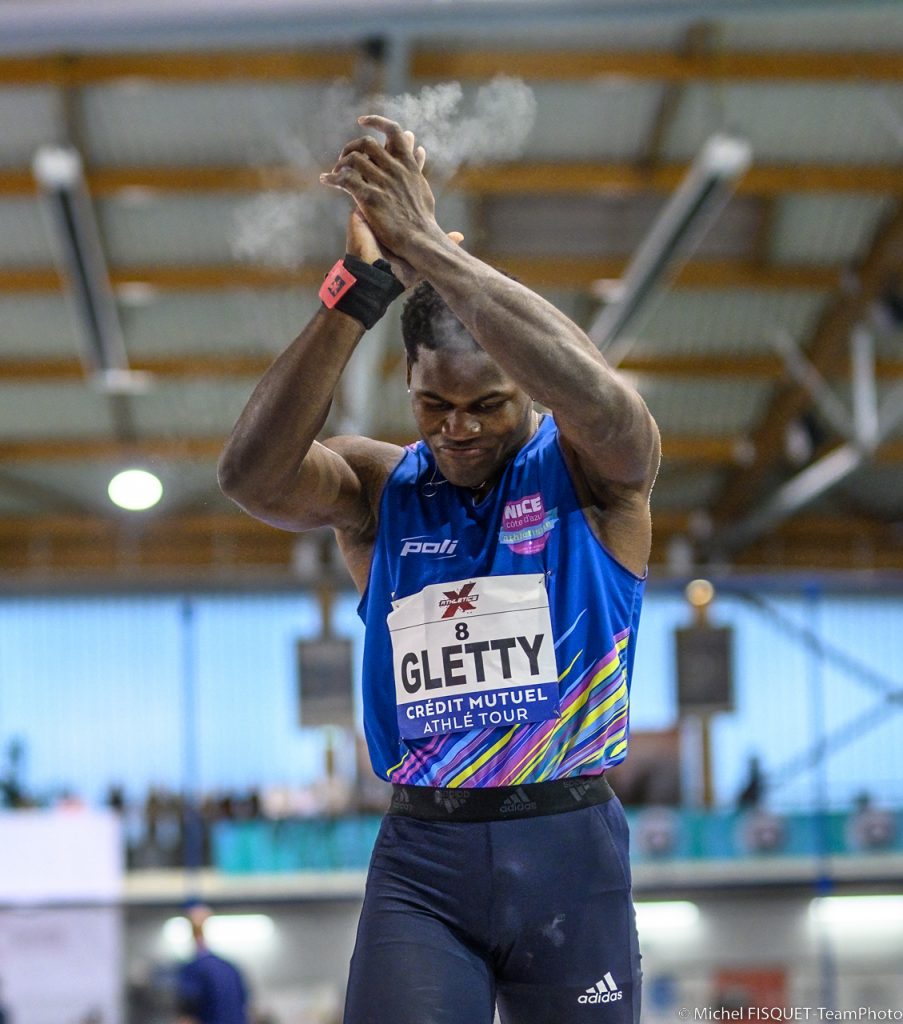
The final event of the day started over an hour late, delayed further by confusion in Group A about who was supposed to be jumping when. That allowed Group B – in which Gaio, Izaguirre and Andreu Boix were competing – to make progress through the lower heights. Both Boix (2.00m) and Gaio (1.94m) jumped close to their lifetime bests, and Izaguirre set an indoor best (1.94m).
Group A finally sorted itself out and six athletes made it to 2m: Ehammer, Hauttekeete, Italy’s Lorenzo Naidon and the home trio of Tristan Marcy, Tanguy Mariac and Clement Balan. Ehammer went one height further to 2.03m, leaving Hauttekeete on his own at 2.06m.
Hauttekeete missed much of 2022 with back problems and it has taken a while for him to return to the form that took him to the World U20 heptathlon record and U20 decathlon medals in 2021. During his world record in February 2021, his standout event was the high jump, where he jumped 2.10m. As Ehammer went out, the Belgian cleared 2.06m and 2.09m, before clearing a lifetime best of 2.12m on the second attempt.
Hauttekeete had been in 18th place after the 60m, moving up to 14th after two events. The shot elevated him to 10th and the 2.12m jump took him to third place overnight: 3356 points behind Ehammer (3540) and Gaio (3389) and ahead of Gletty (3332) and Dester (3304).
The first event of the second day went to form as Ehammer (7.71s) and Gaio (7.84s) dominated in the hurdles. Izaguirre set a national record of 7.92s, Gletty improved his lifetime best from 8.22s to 7.94s, and Dester also improved his PB by 0.02 to 8.02s. Hauttekeete ran 8.11s, dropping to fourth as Gletty moved ahead.
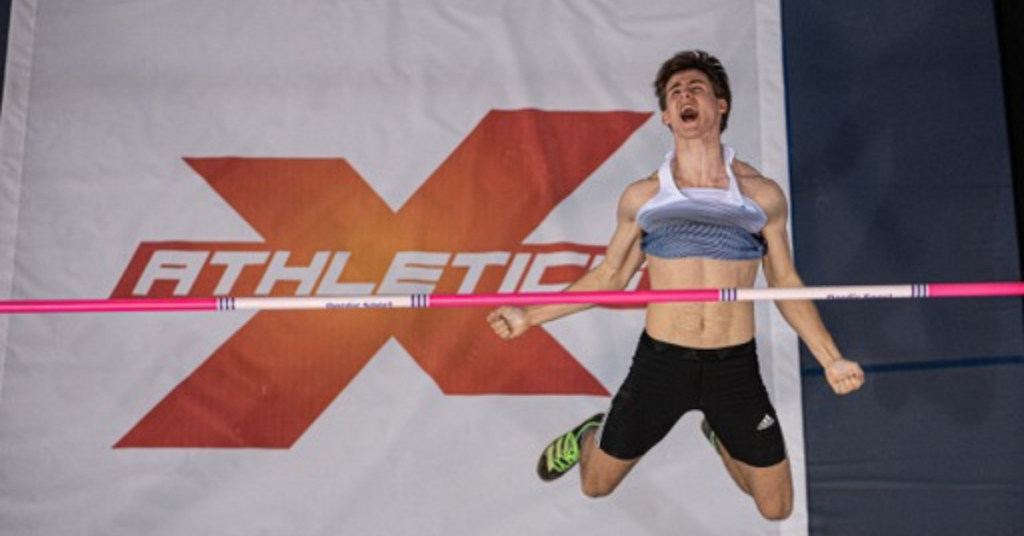
With two events to go, a real dust-up behind Ehammer was looking likely: Gaio and Hauttekeete with comparable bests in the vault and 1000m, Dester likely to improve his position and Gletty on a roll in front of a French crowd.
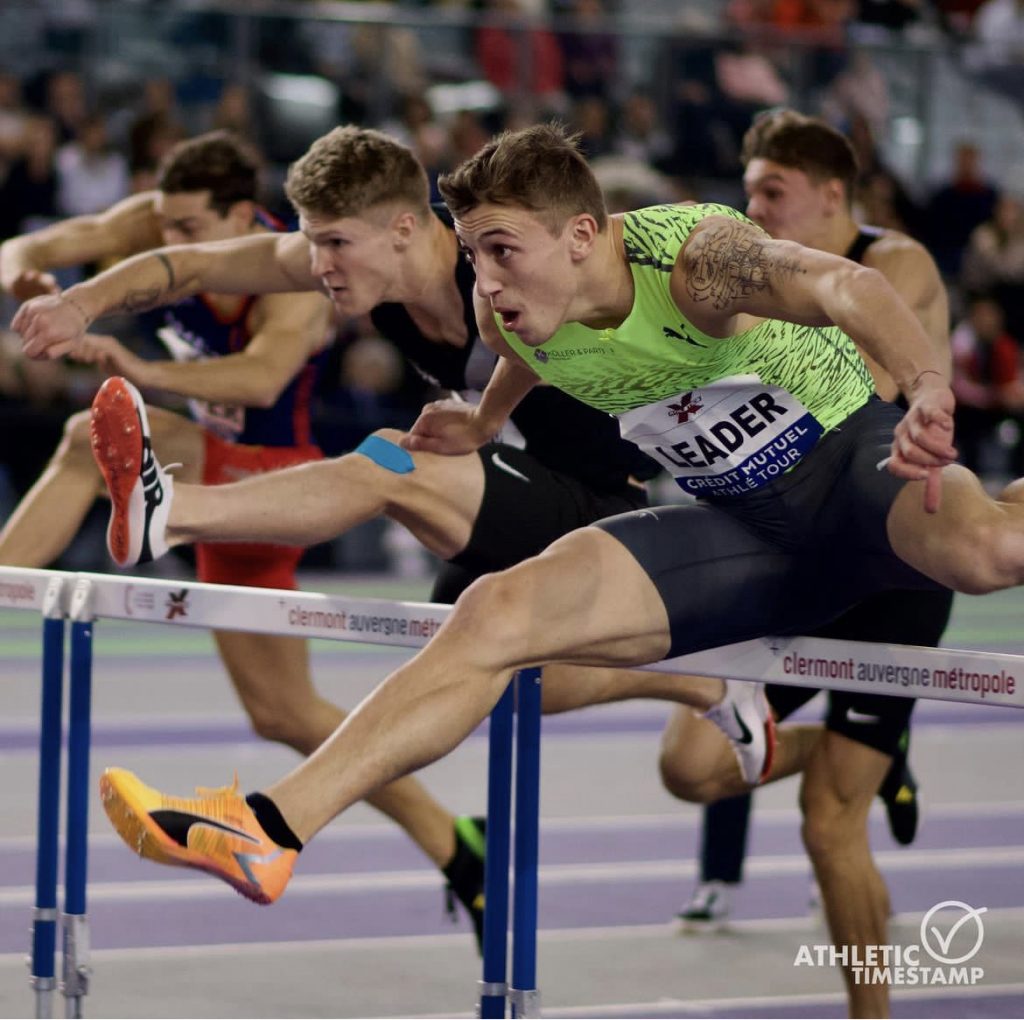
Unfortunately Gaio didn’t make it to the pole vault, feeling unwell earlier in the day and worse ahead of the sixth event. He has the consolation that a first 6000-point score was very much within his grasp.
However, even if Gaio had remained in full health, it would have been a challenge to hold off Hauttekeete.
Gletty only managed 4.41m in the vault, at least 20cm below what he might have expected. The vault then claimed an early victim at 4.51m, as German Marcel Meyer failed to clear his opening height.
The next victim was Manuel Eitel. Although he made it up to 4.71m, he hit his face on the bar during a jump – ok but visibly stunned. Andreu Boix – who was until that point on course for a big PB – tore his hamstring on take-off at the same height.
And then to complete the suite of mishaps, on his third attempt at 5.21m, the bar came down on Ehammer. As he leaped out of the way, his body jack-knifed and he smacked himself in the face with his knee, his nose appearing broken.
But in the midst of all the injuries and accidents, Hauttekeete had another superb vertical jump. His best coming into the vault was 4.70m indoors, and 4.90m outdoors. He cleared 4.71m easily and, moving to new poles, he then cleared 4.81m, 4.91m and 5.01m, his first ever vault above 5m. While it wasn’t the highest vault of the day, his 5.01m was the most significant. As Ehammer stretched his lead to over 300 points (5540), Hauttekeete (5223) had 90 points to spare to Dario Dester (5133) in third, with Gletty (5063) another 70 points behind.
Of the three chasing, Dester was the fastest on paper with a PB of 2:42, while Hauttekeete and Gletty shared a lifetime best of 2:46.
At the gun, Gletty bolted.
The faster, sub 2:40, men in the field like Benjamin Hougardy, Marcel Meyer and Benjamin Fenrich had run in the first heat so Gletty found himself out front. He held his momentum as the laps counted down, and he didn’t fade. He crossed the line first in 2:40.98, taking over five seconds off his previous best. Hauttekeete also ran a three-second lifetime best, finishing in 2:42.40 and one tenth ahead of Dester.
To their credit, both Ehammer (2:51.33) and Eitel (2:48.20 PB) ran close to or under their previous bests, even after dizzying blows to their face.
Ehammer won with 6292, while Hauttekeete scored 6059 in second and Dester again close to 6000 with 5968 in third. Jente is only the second Belgian to score over 6000 points, behind Thomas van der Plaetsen’s 6259, and that score must surely be on borrowed time.
Gletty added 300 points to his best with 5926. Had he not dropped a few heights in the vault, he would have been close to becoming the tenth French decathlete in history to exceed 6000 points.
Arthur Prevost continued to improve with a PB of 5622, a 250 point improvement, while Izaguirre scored 5605, 50 points short of his own national record.
The full results can be found here.
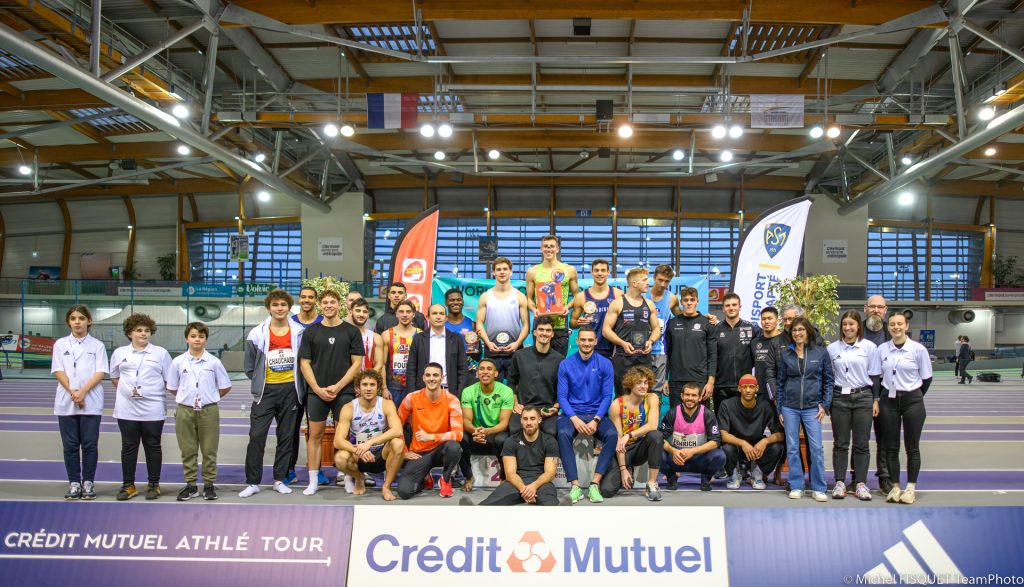
HEPTALEO
In the pentathlon, the French led from start to finish.
Louise Maraval and Leonie Cambours both ran 8.36s in the hurdles, Maraval in the third heat and Cambours in the fourth. Sveva Gerevini was next fastest in 8.37s, while Auriana Lazraq-Khlass ran a lifetime best – and sixth fastest overall – of 8.46s in a curious seeding in the first heat.
Cambours consolidated her opening event with a 1.79m high jump, the highest height of the competition shared by four athletes – Cambours, Bianca Salming of Sweden, Maylis Darriet of France and Commonwealth heptathlon silver medallist Kate O’Connor. Annaelle Nyabeu-Djapa was one height behind with 1.76m, but when added to her 8.38s hurdles, that took her into second place behind Cambours, with O’Connor in third and Lazraq-Khlass moving up to fourth.
Of the strong throwers in the field, 2019 European U23 heptathlon champion Geraldine Ruckstuhl had the longest put with 14.18m, Salming and O’Connor a little below their best and under 14m. However, Nyabeu-Djapa stepped up with a throw of 14.05m and Lazraq-Khlass a first-time 14m+ throw of 14.02m.
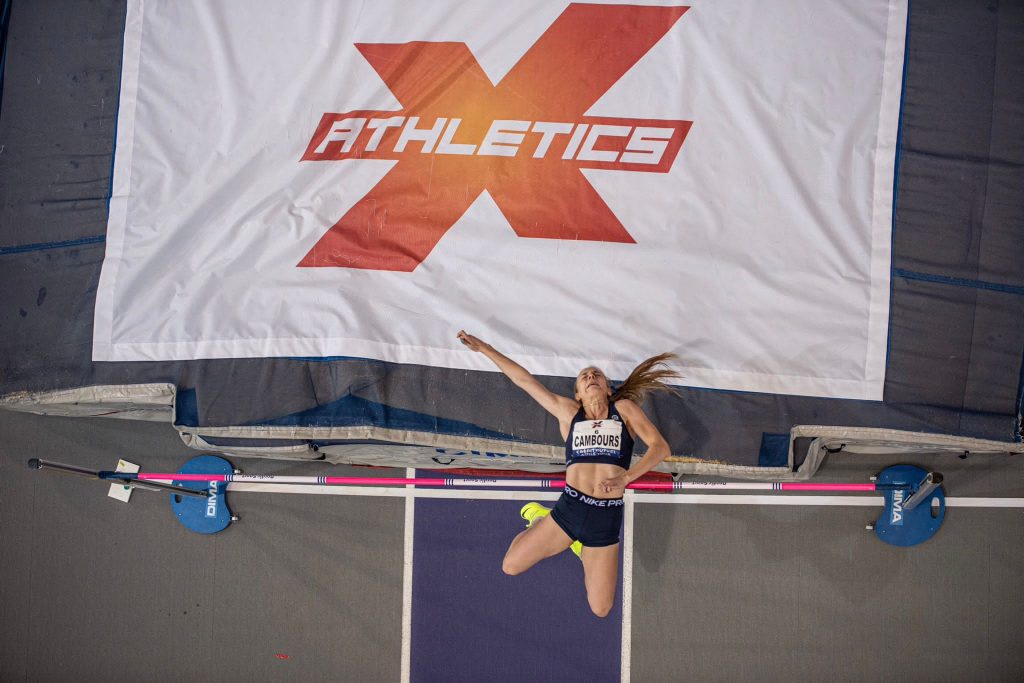
The French then took a stranglehold of the competition: Nyabeu-Djapa briefly relieving Cambours of the lead, and Lazraq-Khlass third, while O’Connor dropped to fourth. Cambours had thrown 12.58m, so the score differential was much closer than the men’s competition: 66 points between first (2769) and fourth (2703).
Onto the long jump, where the Italian pentathlon record holder Sveva Gerevini started her late charge for points. She had the longest jump of 6.18m, and Cambours the other athlete over 6m with 6.13m. Celine Albisser and Katelyn Nadel were next in line with 5.95m and 5.93m respectively, while their teammate Ruckstuhl retired unhappily after jumping 5.58m.
After four events, while Cambours had never been lower than second, the rest of the field had caught up. Leonie had regained the lead and was on 3604 points with a 1000m PB of 2:16. While she could outrun Nyabeu-Djapa (second in 3576), Lazraq-Khlass (third in 3540) and O’Connor (fourth in 3528), the danger was Gerevini – sitting in fifth with 3477 points but with an 800m PB seven seconds and 100 points faster.
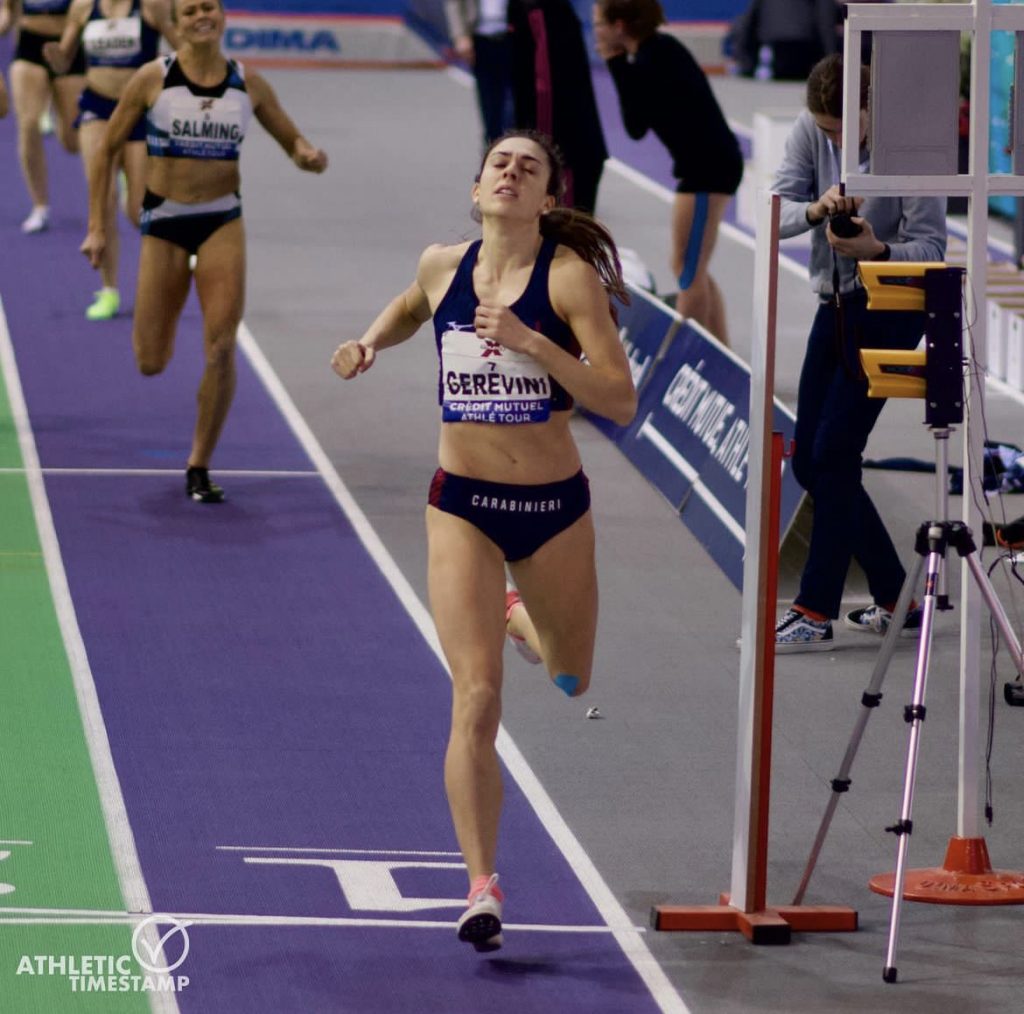
Cheered on by her support team – all wearing blue sweatshirts with “HeptaLeo” on the back – Cambours pushed herself to a new best of 2:15.49, enough to hold off Gerevini who ran 2:12 and moved into second place. O’Connor ran 2:16.73 for third place, but only by two points ahead of Auriana Lazraq-Khlass, who continued her super breakthrough with 4:17.74s, a four second PB.
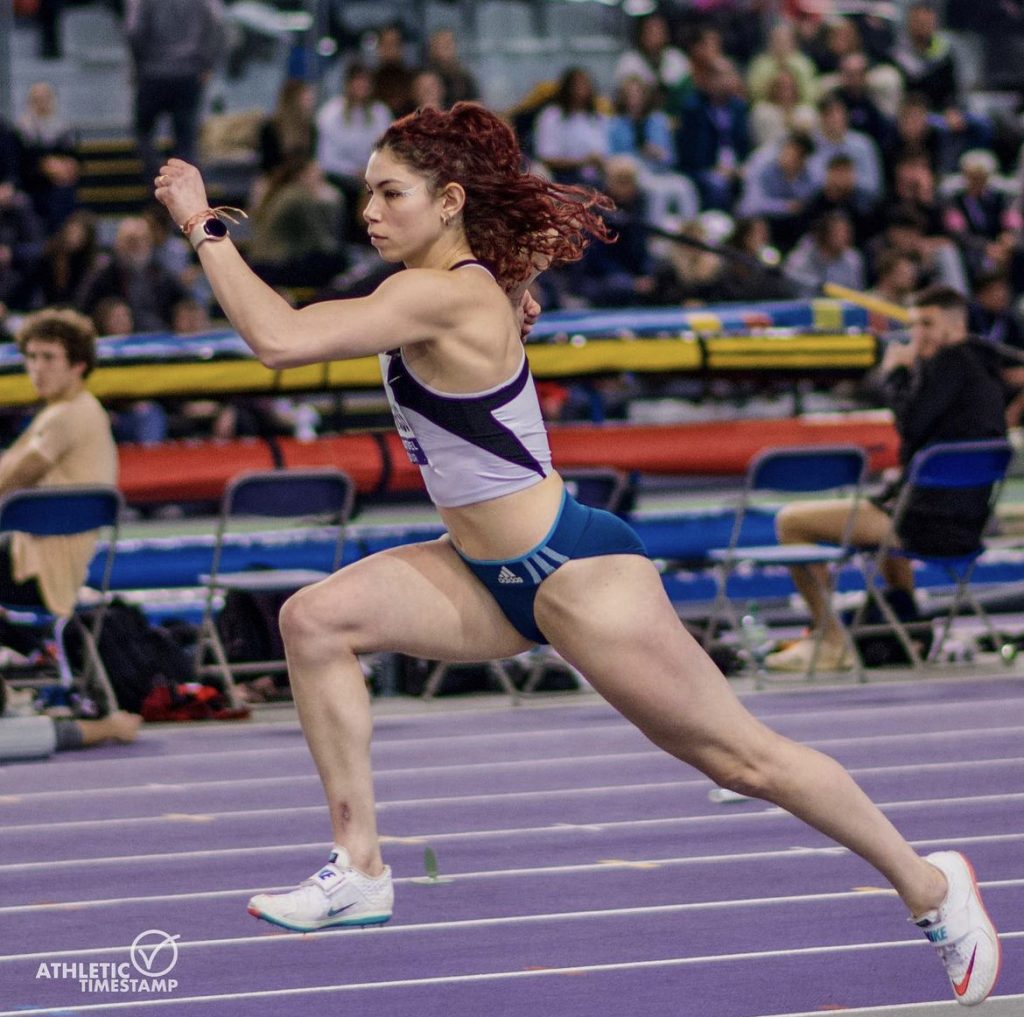
Cambours’ score was a world lead of 4490, Gerevini 4406, O’Connor an Irish record of 4396 and Lazraq-Khlass a 168-point PB of 4394. Annaelle Nyabeu Djapa was fifth with her best score since 2021.
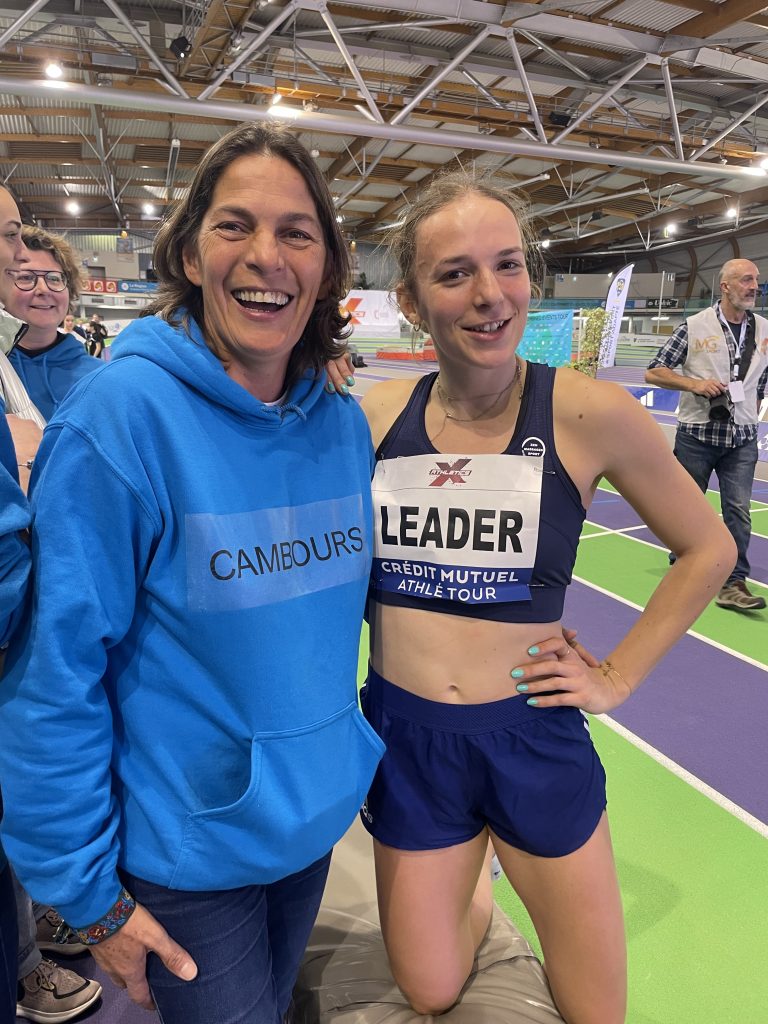
The full results can be found here.
